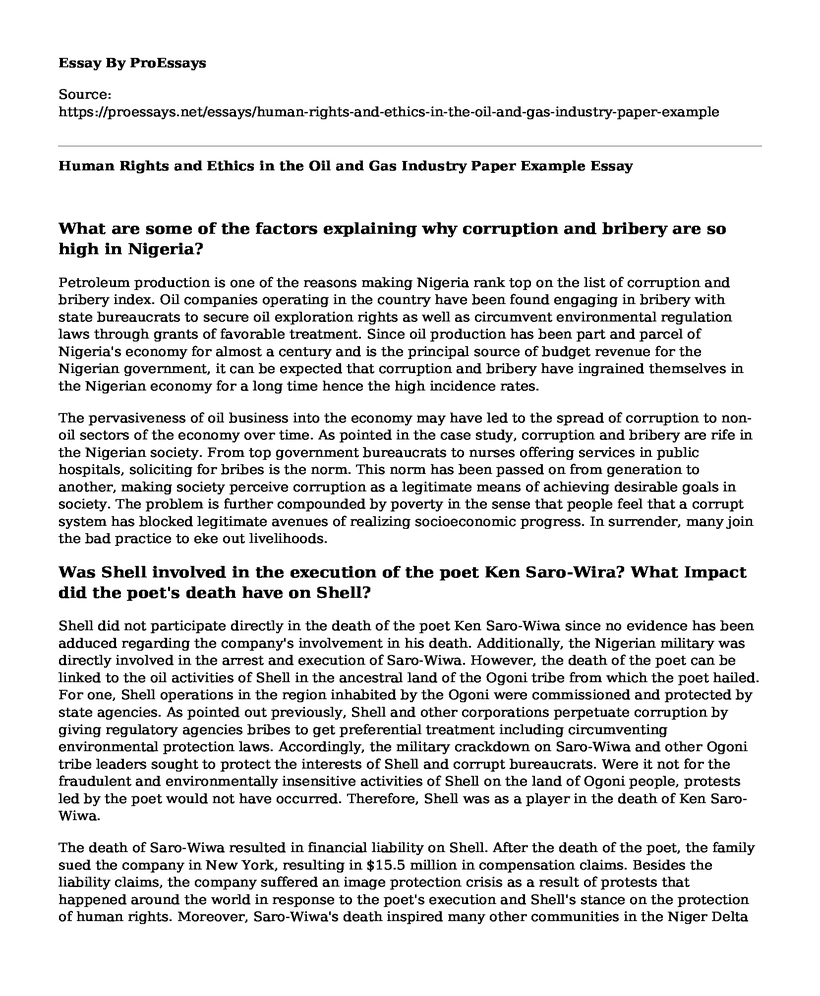What are some of the factors explaining why corruption and bribery are so high in Nigeria?
Petroleum production is one of the reasons making Nigeria rank top on the list of corruption and bribery index. Oil companies operating in the country have been found engaging in bribery with state bureaucrats to secure oil exploration rights as well as circumvent environmental regulation laws through grants of favorable treatment. Since oil production has been part and parcel of Nigeria's economy for almost a century and is the principal source of budget revenue for the Nigerian government, it can be expected that corruption and bribery have ingrained themselves in the Nigerian economy for a long time hence the high incidence rates.
The pervasiveness of oil business into the economy may have led to the spread of corruption to non-oil sectors of the economy over time. As pointed in the case study, corruption and bribery are rife in the Nigerian society. From top government bureaucrats to nurses offering services in public hospitals, soliciting for bribes is the norm. This norm has been passed on from generation to another, making society perceive corruption as a legitimate means of achieving desirable goals in society. The problem is further compounded by poverty in the sense that people feel that a corrupt system has blocked legitimate avenues of realizing socioeconomic progress. In surrender, many join the bad practice to eke out livelihoods.
Was Shell involved in the execution of the poet Ken Saro-Wira? What Impact did the poet's death have on Shell?
Shell did not participate directly in the death of the poet Ken Saro-Wiwa since no evidence has been adduced regarding the company's involvement in his death. Additionally, the Nigerian military was directly involved in the arrest and execution of Saro-Wiwa. However, the death of the poet can be linked to the oil activities of Shell in the ancestral land of the Ogoni tribe from which the poet hailed. For one, Shell operations in the region inhabited by the Ogoni were commissioned and protected by state agencies. As pointed out previously, Shell and other corporations perpetuate corruption by giving regulatory agencies bribes to get preferential treatment including circumventing environmental protection laws. Accordingly, the military crackdown on Saro-Wiwa and other Ogoni tribe leaders sought to protect the interests of Shell and corrupt bureaucrats. Were it not for the fraudulent and environmentally insensitive activities of Shell on the land of Ogoni people, protests led by the poet would not have occurred. Therefore, Shell was as a player in the death of Ken Saro-Wiwa.
The death of Saro-Wiwa resulted in financial liability on Shell. After the death of the poet, the family sued the company in New York, resulting in $15.5 million in compensation claims. Besides the liability claims, the company suffered an image protection crisis as a result of protests that happened around the world in response to the poet's execution and Shell's stance on the protection of human rights. Moreover, Saro-Wiwa's death inspired many other communities in the Niger Delta to stand up against Shell's activities in the region as a strategy of protecting the environment and community rights.
Was Shell taking advantage of the weak local regulation?
From the reactions of Shell to issues of environmental degradation in the Niger Delta, it can be concluded that the oil giant took advantage of the regulatory framework in Nigeria for profits. This can be seen in the bribes Shell paid government officials to allow the company to bypass local regulation. More importantly, Shell hardly accepted responsibility for oil spills, blaming them on thieves and sabotage. In 2008, for instance, Shell attempted to appease the Bodo people with foodstuffs after an oil spill devastated their land. However, it was after the Bodo community lodged a lawsuit that the company finally admitted culpability. Such wait-and-see behavior suggests the company aimed at circumventing local regulation with the assistance government officials but this did not materialize hence the about turn decision of settling the compensation claims outside court.
What can a company do to ensure that it operates ethically in societies with weak regulation?
Engaging stakeholders, especially the host communities, can promote ethical practices among oil and gas companies. When host communities are engaged, there is close collaboration with oil firms on how to deal with the impact of oil mining activities and also reduces the resistance of local communities against oil exploration investments (IPIECA, 2008). This engagement would foster ethical practices in the sense that company operations would be anchored on standards mutually agreed by host communities and the relevant oil companies.
Works Cited
IPIECA. "Human Rights and Ethics in the Oil and Gas Industry." IPIECA, 2008, www.ipieca.org/resources/good-practice/human-rights-and-ethics-in-the-oil-and-gas-industry/.
Cite this page
Human Rights and Ethics in the Oil and Gas Industry Paper Example. (2022, Aug 15). Retrieved from https://proessays.net/essays/human-rights-and-ethics-in-the-oil-and-gas-industry-paper-example
If you are the original author of this essay and no longer wish to have it published on the ProEssays website, please click below to request its removal:
- Paper Sample: Synthetic Marijuana and the Harm It Is Causing to Society
- Paper Example on Protection and Safeguarding of Venerable Adults Based in Ireland and on Irish Legislation
- The HRBA and the Approach Used by Kenya Essay
- How Current Events Affected the Discussion About Gun Control in America
- Essay Example on Patient Protection and Affordable Care Act (ACA)
- Essay Sample on Gun Trafficking & State Gun Laws: Multimedia Communication
- Research Paper on Russia's Cyberwar: Revenge and Security Against Global Cyberattacks







